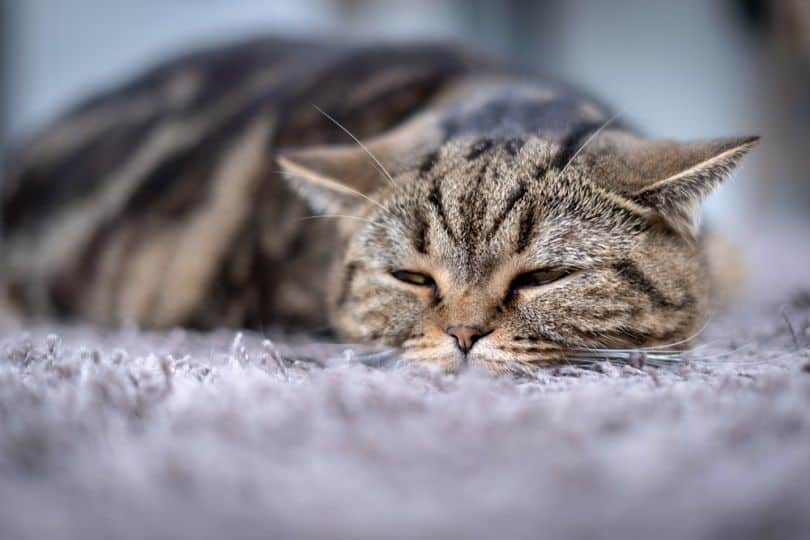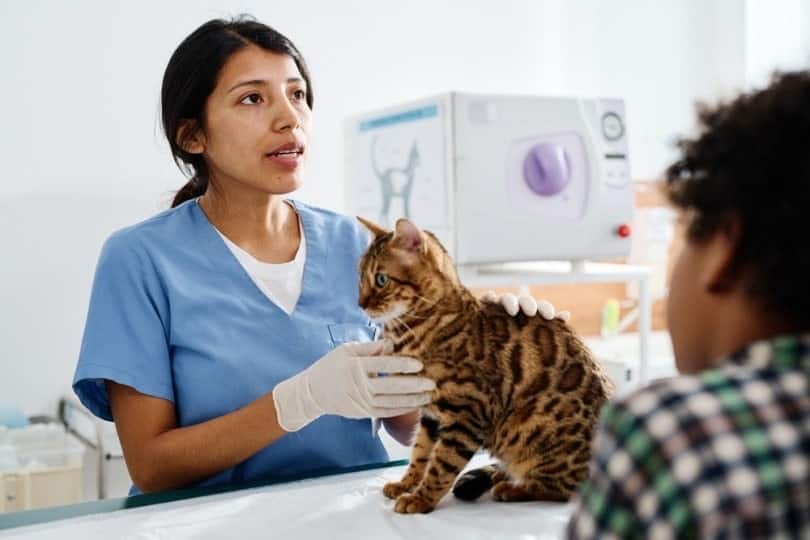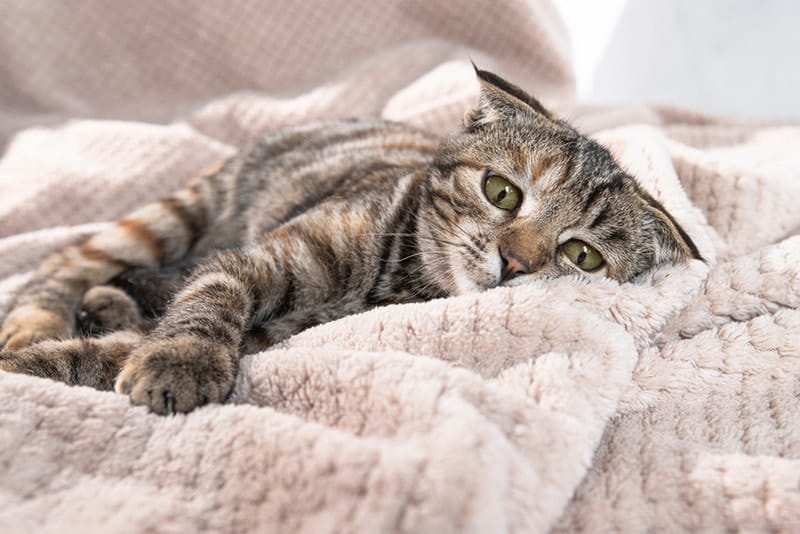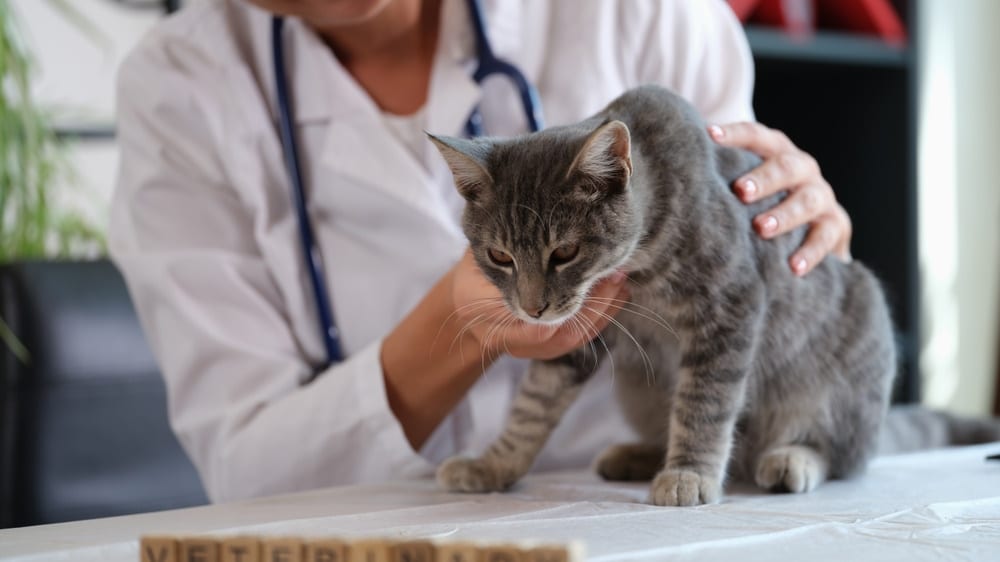It’s comprehensible to really feel frightened in case your as soon as food-loving feline has a diminished urge for food these days however nonetheless acts regular. Though cats may be finicky about mealtimes and their meals preferences, a poor urge for food may point out that one thing is incorrect. There are numerous the reason why your cat may very well be consuming much less meals than regular however nonetheless performing regular.
Not all cats clearly present their discomfort from diseases or stress, which is why cat dad and mom are inspired to watch any modifications of their cats’ behaviors. Adjustments in your cat’s consuming habits shouldn’t be ignored, as there could be an underlying difficulty that wants addressing.
This text will focus on the seven doubtless points behind your cat’s diminished urge for food and in any other case regular habits.

The 7 Causes Your Cat Isn’t Consuming However Appearing Regular
1. Stress
Identical to people, cats may be victims of stress too. Nonetheless, the reasoning behind our stress versus our cats is totally different. Reasonably than stressing about work or cash worries, cats can turn out to be careworn from issues like a brand new pet or child of their residence or different environmental disruptions. Cats don’t deal with stress properly, so you’ll begin seeing modifications of their habits.
A decreased urge for food is a typical signal your cat may very well be feeling careworn or typically feels unwell. Different indicators that might point out your cat is careworn are modifications of their litterbox or sleeping habits.

2. Age
As cats start to age into their senior years, you may discover their urge for food begins lowering. They could in any other case act regular, however you may discover refined modifications of their exercise ranges. It may be regular for a cat to eat a bit much less the older they get due to diminished exercise and a slower metabolism.
In case your cat is consuming much less meals due to their age, the modifications might be extra refined than if it had been from stress or sure diseases. Older cats also can expertise modifications of their meals preferences.
Nonetheless, you need to first rule out ache and medical situations as causes behind your cat’s poor consuming habits. Older cats usually tend to be affected by ache as a consequence of situations comparable to arthritis or dental illness, and plenty of produce other long run illnesses which can suppress their urge for food. Senior cats which are refusing to eat any meals for twenty-four hours ought to be taken to an emergency veterinarian for a well being analysis.
3. Well being Issues
In case your cat is feeling ailing, they could begin refusing meals or eat lower than regular. This may very well be from ache or nausea that’s making it tough for them to maintain meals down. Varied well being issues may cause modifications to your cats’ consuming habits, comparable to kidney illness and pancreatitis. Something that causes nasal congestion and impacts a cat’s sense of scent also can scale back their urge for food. If you happen to suspect that your cat’s urge for food modifications are attributable to a well being drawback, they need to be taken to a veterinarian.
Cats can disguise their well being issues properly as a result of they don’t need to present that they’re weak. So, if they begin refusing meals or consuming lower than regular, it may be an indication that they aren’t feeling properly and you need to get them checked by your vet as quickly as potential.

4. Sudden Dietary Adjustments
Cats may be choosy concerning the meals they eat and aren’t keen on dietary modifications. You probably have just lately switched your cat to a brand new meals or modified up their regular weight loss program, your cat may not present a lot curiosity in consuming it but.
It could take some time for cats to regulate to the totally different flavors and textures of the brand new meals, and they may not get pleasure from it as a lot as their previous meals. It’s higher to steadily introduce new meals into your cats and permit a transitioning interval of seven to 10 days. This might be a lot simpler in your cat’s digestive system and provides them time to regulate to new meals. This gradual transition interval is very vital for felines with delicate stomachs or choosy consuming habits.
Sadly, some cats battle to regulate to new meals if they’ve a powerful choice for his or her previous weight loss program. Your cat might be not keen on the brand new flavors or prefers both the moist or dry meals that they beforehand ate.
5. Sure Drugs
In case your cat is on remedy, whether or not acute or power, a decreased urge for food may very well be a aspect impact. Drugs comparable to antibiotics can have unwanted side effects like nausea and an upset abdomen that may make it tough in your cat to eat usually. It is very important focus on together with your cat’s veterinarian any modifications in your cat’s habits and urge for food on their remedy.

6. Dental Points
Dental points are widespread in cats and may impression how they eat. Gingivitis, stomatitis, mouth ulcers, periodontal illness, or tooth infections are a number of the dental points that may have an effect on cats. It may be painful and tough for cats to eat their meals if they’ve dental points.
Not all cats present apparent indicators of dental illness till they’re evaluated by a veterinarian, so a decreased urge for food could be the primary signal to look out for. If you happen to suspect that your cat just isn’t consuming a lot meals due to dental points, you will have to get them checked out by a vet.
In any other case, some cats gained’t eat for just a few hours after getting dental surgical procedure or tooth cleansing. This may very well be from any swelling and discomfort of their mouth that’s making it difficult for them to eat. Your cat’s veterinarian may advocate feeding them moist or mushy meals till your cat recovers.
7. Gastrointestinal Issues
Like people, cats can have gastrointestinal issues like nausea and abdomen ache that may have an effect on their urge for food. They might have eaten meals earlier that didn’t agree with their abdomen, or maybe they’ve acid reflux disorder or irritable bowel disease. This may trigger your cat to lose their urge for food and never eat a lot till their gastrointestinal issues ease up.


Conclusion
If your cat is reluctant to eat their meals however nonetheless acts usually, don’t hesitate to contact a veterinarian. Cats ought to by no means go greater than a few days with out consuming any meals due to the danger of hepatic lipidosis (fatty liver disease), a typical reason behind liver failure in cats. It’s not a very good signal for cats to start out consuming much less meals or refusing meals solely.
Even when your cat appears in any other case regular, the diminished urge for food is an indication that they aren’t. It’s advisable to have them checked out by your vet as quickly as potential
Featured Picture Credit score: 4 PM manufacturing, Shutterstock
